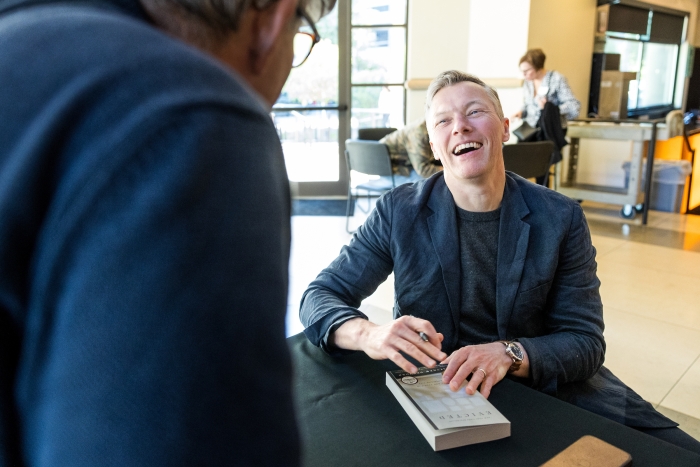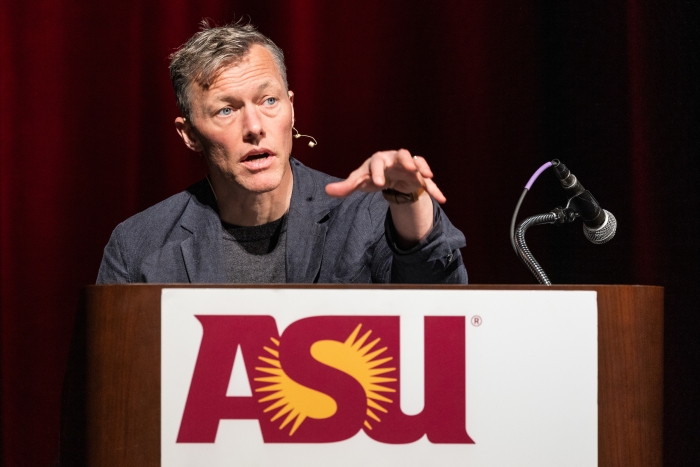Pulitzer Prize-winning author Matthew Desmond: 'Poverty is stealing people's lives'
The ASU alum was guest speaker at annual John P. Frank Memorial Lecture
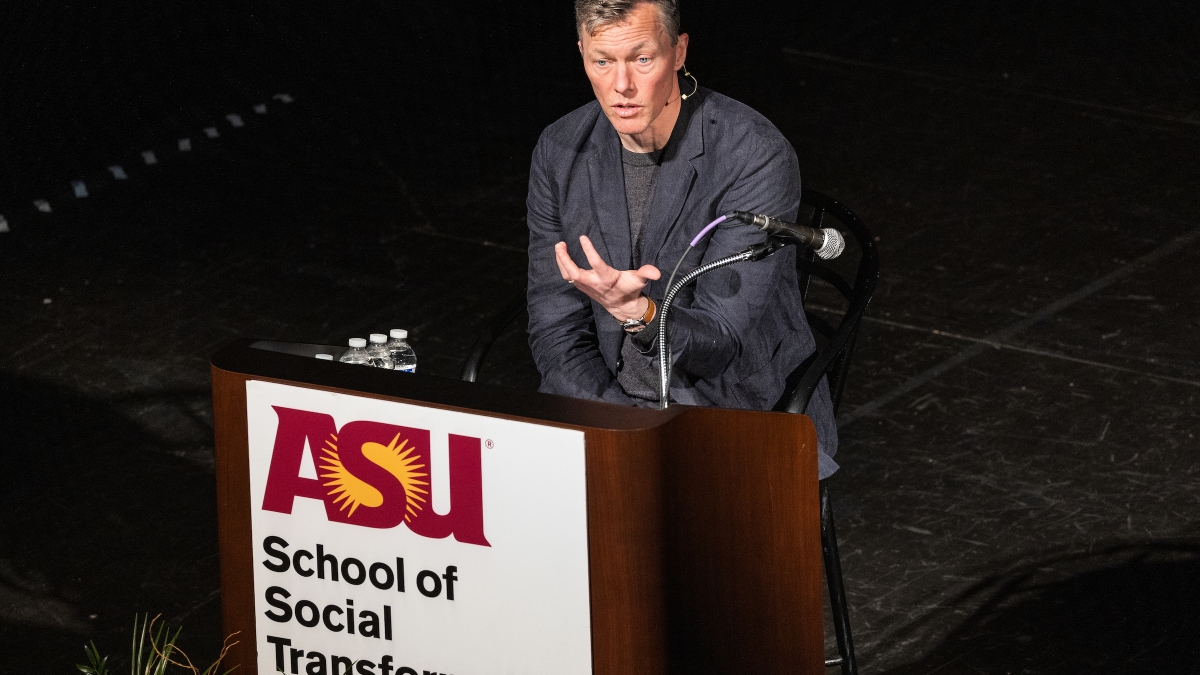
Matthew Desmond, who graduated from Barrett, The Honors College in 2002 with a Bachelor of Science in communications and justice studies, was the guest speaker at the 25th annual John P. Frank Memorial Lecture, which addressed the issue of poverty in America. Photo by Charlie Leight/ASU News
Why is there so much poverty in America?
That question was asked Monday by Matthew Desmond, the Maurice P. During Professor of Sociology at Princeton University and the author of the 2016 Pulitzer Prize-winning book “Evicted: Poverty and Profit in the American City.”
Desmond, who graduated from Arizona State University's Barrett, The Honors College in 2002 with a Bachelor of Science in communications and justice studies, was the guest speaker at the 25th annual John P. Frank Memorial Lecture, held at the Herberger Theater Center in downtown Phoenix.
The event, put on by ASU's School of Social Transformation, is a collaboration with the university's Center for Work and Democracy, The College of Liberal Arts and Sciences, the Watts College of Public Service and Community Solutions, and the city of Phoenix.
“It’s always touching and special to come back (home),” Desmond said.
Desmond, whose new book is titled “Poverty, by America,” said it’s shameful that in a “country with obscene riches,” 38 million Americans are poor — as determined by government statistics — and one in 18 live in deep poverty.
“Poverty is like chronic pain on top of tooth rot, on top of debt,” he said. “It’s the suffocation of your talents and your dreams. … Poverty is like this tight knot of humiliations and its existence in American life means that millions of us are denied safety, security and dignity in the richest country in the history of the world.”
Desmond’s interest in the root cause of poverty came naturally. He grew up in Winslow, Arizona, in a family, he said, that suffered some of the indignities of poverty. Their gas was cut off when they couldn’t pay the bill. They declared bankruptcy. Eventually, the bank took their home.
“It started me on this journey, this process to start asking this question of, ‘Why is this how this country handles a family when they fall on hard times?’” Desmond said.
As he did research for his book, Desmond said he met people who believed poverty is inevitable, that neither government nor individuals can solve such a complex problem. But he said history shows that’s not the case.
The War on Poverty legislation introduced by President Lyndon B. Johnson in the 1960s cut the poverty rate in half within 10 years, he said, adding that things like housing assistance and food stamps are "lifesavers, lifting millions and millions of families out of poverty every year.”
The government hasn’t cut its aid to the poor in the last 50 years, Desmond said. Spending on programs such as housing assistance, food stamps and welfare increased from $1,000 per person in the first year of the Ronald Reagan administration to about $3,400 per person the first year of Donald Trump's administration.
And yet, Desmond said, poverty is “literally stealing people’s lives.”
Some numbers, according to Desmond:
• Since 2,000, eviction filings have increased 22%, and the number of families relying on food pantries to eat has risen 19%.
• Since the great recession in 2008, the number of public school children known to be homeless has increased 74%.
• Since the 1990s, the number of Americans receiving food stamps and reporting no other cash income has more than quadrupled.
“These are really troubling signs, and they mean for scores of families, poverty has become a persistent and regular part of American lives,” Desmond said.
The problem, Desmond said, is not that aid isn’t available. It’s that it is not getting to the people who need it. He told the story of a man he met in Milwaukee who needed assistance after an infection from stepping on a nail was accelerated by his diabetes and ultimately resulted in part of his his leg being amputated.
The man’s application for disability was denied, Desmond said, so he had to hire a lawyer to try to get his money, and the lawyer was working on a contingency basis, taking a quarter of the back pay the man would receive.
Upon hearing this, Desmond wondered how much public aid was winding up in attorneys’ hands. He discovered that every year, $1.2 billion in social security funds goes to lawyers.
“A dollar in the budget doesn’t necessarily mean a dollar in someone’s hands,” he said.
Desmond, while admitting the welfare state in America is a “leaky bucket,” disputed the notion that welfare dependency is an attributing factor in poverty. Instead, he said, data shows that the bigger problem is welfare avoidance.
He said more than $140 billion a year in aid — food stamps, government health insurance, social security income, unemployment insurance, etc. — goes unused because people are either unaware or unable to utilize the government resources that provide that aid.
“It’s a picture of us, frankly, doing a terrible job of connecting families to programs they need and deserve,” he said.
Desmond cited several other factors in explaining poverty’s hold on millions of families. He said inflation adjusted wages for men without a college degree is less than it was 50 years ago. Poor families are being exploited by the housing market as well. Since 1985, rents have outpaced income gains by 325%.
Desmond also lamented the “walls” built around communities. In designing communities of concentrated affluence, he said, there’s a side effect in creating communities of concentrated poverty.
“I think there’s so much poverty in America not in spite of our walls, but because of them,” he said.
Desmond said addressing the exploitation in the housing, labor and financial markets won’t be solved by simply turning the faucet on more. Policies, he said, have to change so the poor have power and voice in their communities.
As an example, he cited the lack of housing options for lower-income families.
“They basically have one choice,” he said. “They have to rent from a private landlord and give him or her most of their income. Most renting families on the poverty line spend about 50% of their income on housing. It’s brutal. So we basically have to expand the kind of housing choices these families are making.”
Near the end of his speech, Desmond said reducing or eliminating poverty requires three foundational changes:
• Invest in families by rebalancing the safety net.
• Empower the poor by reining in exploitation.
• Build inclusive and open communities.
“I want to end poverty in America,” Desmond said. “This is how we can do it. Why settle for anything less?”
More Local, national and global affairs
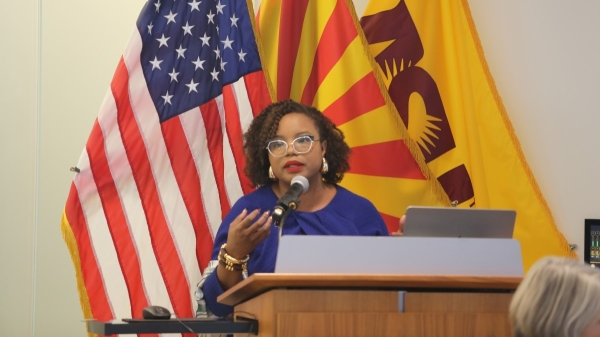
Economic development, the 'Black tech ecosystem' and a tale of two economies
When it comes to funding technology cluster initiatives, people across the country want to see how experts are analyzing long-term outcomes that benefit urban and rural communities. And policymakers…
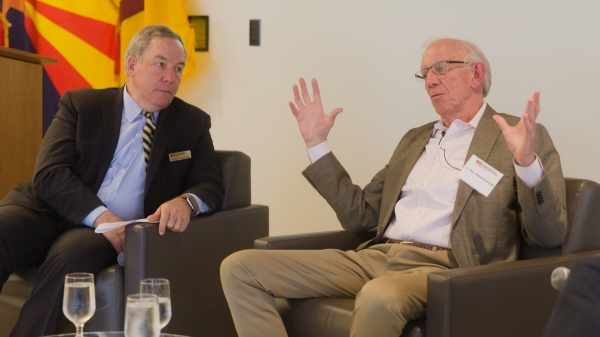
ASU lab hosts discussion on cyber defense as a deterrent
The Leadership, Democracy, and National Security Lab invited retired Lieutenant General Robert Schmidle Jr., the former deputy commander of U.S. Cyber Command, to speak about the strategic imperative…
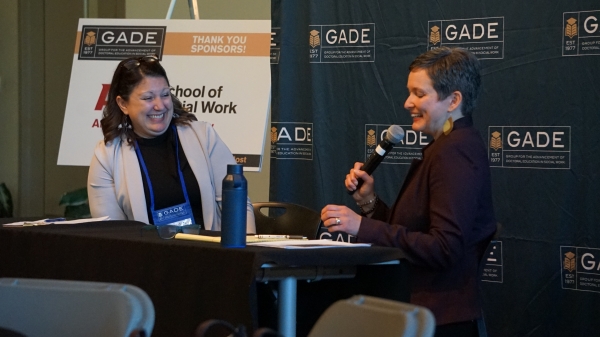
Sustainability takes spotlight at ASU-hosted social work educators conference
The academic discipline of social work not only educates future social workers who help people cope with life’s challenges — it also advances research that furthers social change. To further that…
